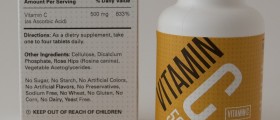Magnesium stearate is a substance which is commonly used as lubricating and diluting ingredient in various different types of baby formulas, vitamin supplements, tablets and capsules. Magnesium stearate is actually a magnesium salt which also contains a certain type of saturated fatty acid known as stearic acid. It is characterized by a white color and it is in solid state when at room temperature. Sometimes it is also referred to as octadecanoic acid.
Stearic acid can be found in its natural form in meat, poultry, fish, eggs, milk, coconuts, cocoa and several other different types of food sources. Some sources claim that magnesium stearate is perfectly safe for use in the manufacture of pharmaceuticals and supplements but there also certain sources which claim that it can be associated with various side effects.
Magnesium Stearate Uses
Magnesium stearate is commonly used as a very efficient diluting agent in the manufacture or capsules and other sorts of dietary supplements. It is often used as a stabilizer in the manufacture of supplements which incorporate multiple vitamins all at once. Magnesium stearate is often used as a component which binds and emulsifies the varnish driers, paints, hard candies, baby cosmetics and baby formulas.
Magnesium stearate is widely known for its very potent lubricating properties and that is the main reason why it is used so intensively in the pharmaceutical industries. Magnesium stearate is the capsule itself when it becomes added to the composition of tablets because it is very efficient in preventing all the different types of components from adhering to the equipment used for the encapsulation.
Magnesium Stearate Side Effects
Dietary supplements and other similar products may be formulated without the use of magnesium stearate, but the process then takes much more time and it is much trickier to perform. The FDA certifies magnesium stearate as a granulating agent. The most important side effect of magnesium stearate is toxicity. This is mainly due to the fact that magnesium salt is commonly isolated from hydrogenated cottonseed oil or palm oil, which are known for often containing hazardous pesticides.
Magnesium stearate is safe, but only when taken in small amounts. It is very dangerous because it may induce decreased absorption of various different types of important nutrients. Magnesium stearate is also very harmful because it suppresses the functioning of the immune system. Magnesium stearate may also be associated with certain types of inflammatory conditions.
Magnesium Stearate Research
- For food applications, magnesium stearate is typically manufactured by one of two processes. The direct or fusion process involves direct reaction of fatty acids with a source of magnesium, such as magnesium oxide, to form magnesium salts of the fatty acids. In the indirect or precipitation process, a sodium soap is produced by reacting fatty acids with sodium hydroxide in water and precipitating the product through addition of magnesium salts to the soap.
- Upon ingestion, magnesium stearate is dissolved into magnesium ion and stearic and palmitic acids. Magnesium is absorbed primarily in the small intestine, and to a lesser extent, in the colon. Magnesium is an essential mineral, serving as a cofactor for hundreds of enzymatic reactions and is essential for the synthesis of carbohydrates, lipids, nucleic acids and proteins, as well as neuromuscular and cardiovascular function.
- The majority of magnesium content in the body is stored in bone and muscle. A small amount (?1%) is present in serum and interstitial body fluid, mostly existing as a free cation while the remainder is bound to protein or exists as anion complexes. The kidney is largely responsible for magnesium homeostasis and maintenance of serum concentration. Excretion occurs primarily via the urine, but also occurs in sweat and breast milk.
- Upon ingestion, magnesium stearate dissolves into its component ions, magnesium and stearic and palmitic acids. Therefore, the safety assessment should be based on its constituent cations and anions. Fatty acids are normal constituents of coconut oil, butter and other edible oils and have not been considered to pose a toxicological risk. As such, it was concluded that stearic and palmitic acids used as flavouring agents do not present a safety concern.
- Many magnesium-containing food additives have been evaluated individually, but not collectively, for laxative effects. Based on the recent dietary exposure assessment to magnesium stearate and concern that use of magnesium salts in many food additives may result in cumulative exposure that could lead to a laxative effect, JECFA reiterated its earlier recommendation that total dietary exposure to magnesium from food additives and other sources in the diet be assessed. Although effects of cumulative exposure to magnesium via food additives should be evaluated, the studies reported here indicate a lack of genotoxic risk posed specifically by magnesium stearate consumed at current estimated dietary exposures.

















_f_280x120.jpg)
Your thoughts on this
Loading...